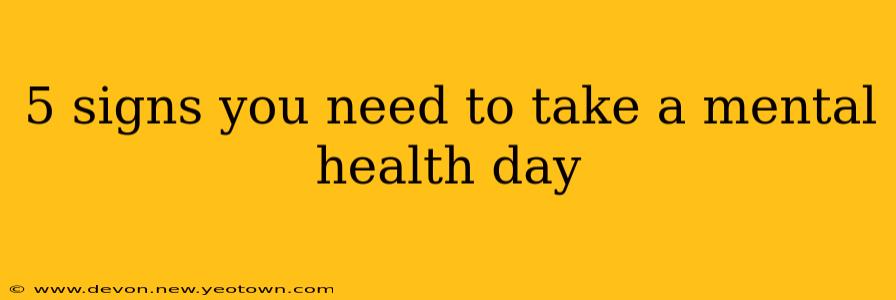5 Signs You Need to Take a Mental Health Day (And Why You Should)
Life can feel like a relentless rollercoaster, a whirlwind of deadlines, responsibilities, and expectations. We push ourselves, striving for perfection, often neglecting the most important person in the equation: ourselves. But what happens when the strain becomes too much? Ignoring the subtle (and sometimes not-so-subtle) signs of burnout can lead to serious consequences. This isn't about laziness; it's about recognizing the importance of self-care and prioritizing your mental well-being. Let's explore five key signs that scream "You need a mental health day!"
1. Persistent Feelings of Overwhelm and Anxiety: Is it just stress, or something more?
Imagine this: you wake up, and before your feet even hit the floor, a wave of anxiety washes over you. The day ahead feels insurmountable, a mountain of tasks looming large and menacing. This isn't just the usual "Monday morning blues"; this is a persistent, pervasive feeling of being overwhelmed. You might find yourself constantly worrying, struggling to concentrate, and experiencing physical symptoms like headaches, stomach aches, or muscle tension. This is your body's SOS signal – a clear indication that you're running on empty and need a break. Ignoring these feelings can lead to more serious issues down the line, so listening to your body's whispers is crucial.
2. Difficulty Concentrating and Reduced Productivity: Brain fog is a real thing.
Remember that feeling of effortless flow, when tasks seemed to melt away with ease? Now, you find yourself staring blankly at your computer screen, struggling to focus on even the simplest of tasks. Your productivity has plummeted, and that nagging sense of inadequacy only adds to your growing stress. This isn't about lacking motivation; it's about your brain being overloaded and needing time to rest and recharge. Pushing through will only exacerbate the problem, leading to further frustration and a downward spiral. Taking a break to clear your head might be the key to unlocking your productivity again.
3. Irritability and Short Temper: Is everyone else annoying, or is it you?
Suddenly, you find yourself snapping at colleagues, friends, and even loved ones. Minor inconveniences trigger disproportionate reactions, leaving you feeling guilty and frustrated. This irritability isn't just a bad mood; it's a sign that your emotional reserves are depleted. Your patience is wearing thin, and your fuse is exceptionally short. Recognizing this pattern is essential; it's a clear indicator that you need to step back, de-stress, and replenish your emotional energy before you unintentionally damage your relationships.
4. Physical Symptoms: Your body is talking – listen!
Mental health and physical health are intricately linked. When your mental well-being suffers, your body often follows suit. Experiencing persistent headaches, muscle tension, digestive problems, insomnia, or fatigue could all be manifestations of underlying stress and burnout. These physical symptoms are your body's way of saying, "Hey, you're pushing too hard!" Ignoring these warnings can lead to chronic health issues, so addressing the root cause – often mental health stress – is vital.
5. Loss of Interest and Motivation: The joy is gone.
Remember the things you used to enjoy? The hobbies that once brought you joy, the activities that sparked your passion? Now, they feel like a chore, devoid of any pleasure or excitement. This loss of interest and motivation is a significant warning sign. When even the things you love feel draining, it's a clear indication that you're emotionally exhausted and need time to reconnect with yourself and rediscover your zest for life.
Taking a Mental Health Day: It's Not Selfish, It's Self-Preservation
Taking a mental health day isn't a sign of weakness; it's a sign of strength. It's about recognizing your limits, prioritizing your well-being, and proactively preventing burnout. It's an investment in your long-term health and happiness. Use this time wisely: disconnect from work, engage in activities you enjoy, spend time with loved ones, or simply relax and recharge. Remember, a rested and rejuvenated you is a more productive and engaged you.

